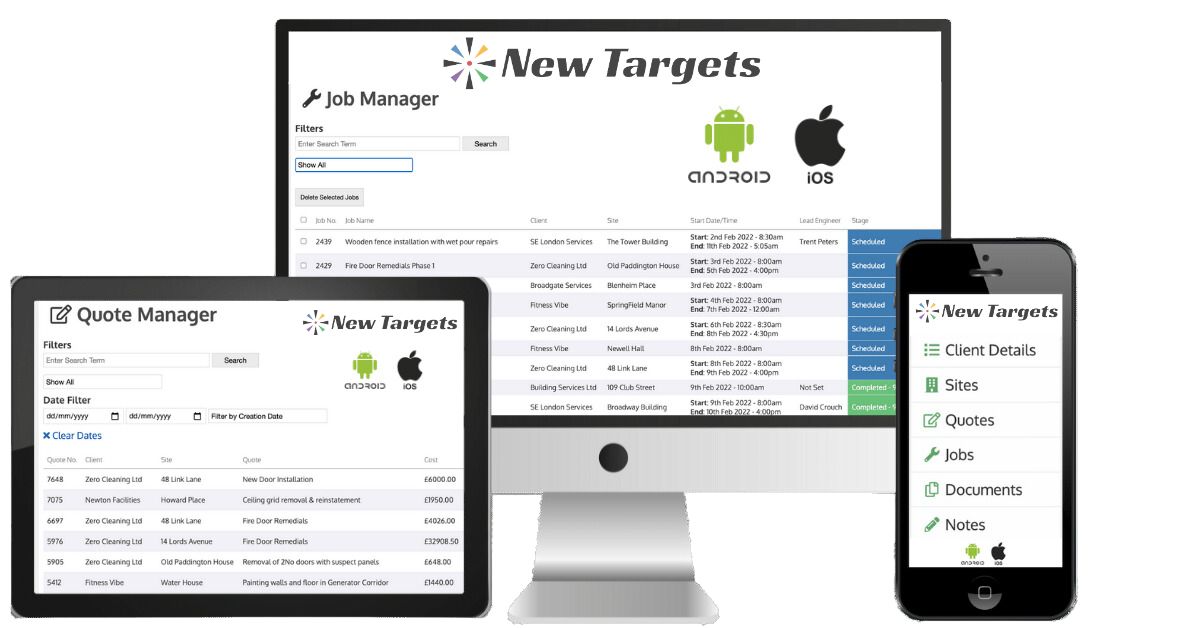How to Improve The Bottom Line.
~
Why Use a Job Management System?
By adopting streamlining methodologies and integrating them with a Job Management System (JMS), Planned Preventive Maintenance (PPM) businesses can significantly improve their outcomes.
These methodologies concentrate on enhancing efficiency, reducing waste, and improving quality, which aligns well with the objectives of PPM businesses.
Looking for, identifying and eliminating wasteful practices when managing your teams performing maintenance tasks improves the efficiency and quality of the service your company provides to its clients.
Reduce business costs by minimising wastage.
Reducing waste and optimising processes leads to cost savings, which is crucial for PPM businesses operating on tight budgets.
“How do you choose the best system for your business?”
Operational Excellence through Statistics
Focusing on statistical analysis and process improvement can increase the operational efficiency of PPM activities, leading to higher customer satisfaction and retention.
Using JMS to Make Decisions Based on Data
Integrating a Job Management System into your business can improve data-driven decision-making. This approach allows PPM businesses to make more informed and strategic choices in managing maintenance operations.
Operational Standardisation:
Implement a service delivery framework through your Job Management System to ensure client consistency.
Incorporating Lean and Six Sigma methodologies into a PPM business using a Job Management System creates a synergy that enhances operational efficiency, reduces costs, and improves service quality, leading to better business outcomes.
Here’s how this can be achieved:
Data Collection and Analysis:
A job management system allows for the collection of crucial data such as job completion times, resource allocation, and material usage. It can track the time it takes to complete specific tasks, the frequency of certain job types, and the associated costs. This data collection helps in understanding where improvements can be made.
Performance Metrics:
Your job system can capture and analyse performance metrics such as on-time job completion, resource utilisation, and customer feedback. The software can also help create Dashboards and reports that clearly show the key performance indicators (KPIs).
Job Costing and Tracking:
The system can monitor expenses related to specific jobs, such as labour, materials, and equipment usage. Comparing these expenses to job revenue makes it easier to identify potential savings opportunities.
Resource Optimisation:
Using a job management system can be beneficial in terms of resource allocation. This system analyses resource usage data and helps identify areas where resources are underutilised or wasted. Optimising resources can lead to cost savings while ensuring that the quality of service remains the same or even improves.
Insights for Improving Services:
The job management system can provide insights into areas where service delivery can be improved by tracking job completion times, customer feedback, and service metrics. It can help identify patterns of customer complaints, job delays, or other service-related issues that need attention.
Integrating with financial systems:
A job management system can often integrate with financial software. This allows for directly comparing job costs and revenues, providing a clear understanding of the economic impact of service improvements and operational changes.
Customer Satisfaction and Retention:
It could be that the system tracks customer satisfaction levels and ties them to specific jobs or services. Improving service delivery saves costs and enhances customer satisfaction, improving customer retention and potentially increasing revenue.
Real-Time Monitoring:
A job management system can provide real-time monitoring capabilities, enabling immediate insights into job progress, service delivery, and resource utilisation. This can lead to proactive decision-making and faster response to service delivery issues.
Companies can benefit in many ways from using a job management system. It provides them with detailed insights into their operations, helps identify areas that need improvement, and highlights opportunities for cost savings while improving service delivery.
A system can be a valuable tool for showcasing the tangible advantages of process improvements and operational efficiencies when pitching to a potential client!
By New Targets | Job Management Systems | Free Trial Available


